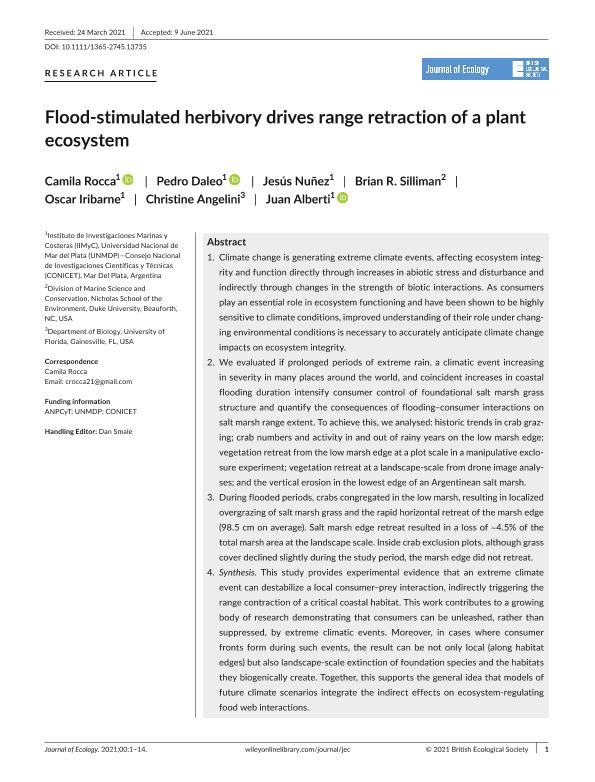Artículo
Flood-stimulated herbivory drives range retraction of a plant ecosystem
Rocca, Camila ; Daleo, Pedro
; Daleo, Pedro ; Nuñez, Jesus Dario
; Nuñez, Jesus Dario ; Silliman, Brian Red; Iribarne, Oscar Osvaldo
; Silliman, Brian Red; Iribarne, Oscar Osvaldo ; Angelini, Christine; Alberti, Juan
; Angelini, Christine; Alberti, Juan
 ; Daleo, Pedro
; Daleo, Pedro ; Nuñez, Jesus Dario
; Nuñez, Jesus Dario ; Silliman, Brian Red; Iribarne, Oscar Osvaldo
; Silliman, Brian Red; Iribarne, Oscar Osvaldo ; Angelini, Christine; Alberti, Juan
; Angelini, Christine; Alberti, Juan
Fecha de publicación:
06/2021
Editorial:
Wiley Blackwell Publishing, Inc
Revista:
Journal of Ecology
ISSN:
0022-0477
Idioma:
Inglés
Tipo de recurso:
Artículo publicado
Clasificación temática:
Resumen
Climate change is generating extreme climate events, affecting ecosystem integrity and function directly through increases in abiotic stress and disturbance and indirectly through changes in the strength of biotic interactions. As consumers play an essential role in ecosystem functioning and have been shown to be highly sensitive to climate conditions, improved understanding of their role under changing environmental conditions is necessary to accurately anticipate climate change impacts on ecosystem integrity. We evaluated if prolonged periods of extreme rain, a climatic event increasing in severity in many places around the world, and coincident increases in coastal flooding duration intensify consumer control of foundational salt marsh grass structure and quantify the consequences of flooding–consumer interactions on salt marsh range extent. To achieve this, we analysed: historic trends in crab grazing; crab numbers and activity in and out of rainy years on the low marsh edge; vegetation retreat from the low marsh edge at a plot scale in a manipulative exclosure experiment; vegetation retreat at a landscape-scale from drone image analyses; and the vertical erosion in the lowest edge of an Argentinean salt marsh. During flooded periods, crabs congregated in the low marsh, resulting in localized overgrazing of salt marsh grass and the rapid horizontal retreat of the marsh edge (98.5 cm on average). Salt marsh edge retreat resulted in a loss of ~4.5% of the total marsh area at the landscape scale. Inside crab exclusion plots, although grass cover declined slightly during the study period, the marsh edge did not retreat. Synthesis. This study provides experimental evidence that an extreme climate event can destabilize a local consumer–prey interaction, indirectly triggering the range contraction of a critical coastal habitat. This work contributes to a growing body of research demonstrating that consumers can be unleashed, rather than suppressed, by extreme climatic events. Moreover, in cases where consumer fronts form during such events, the result can be not only local (along habitat edges) but also landscape-scale extinction of foundation species and the habitats they biogenically create. Together, this supports the general idea that models of future climate scenarios integrate the indirect effects on ecosystem-regulating food web interactions.
Archivos asociados
Licencia
Identificadores
Colecciones
Articulos(IIMYC)
Articulos de INSTITUTO DE INVESTIGACIONES MARINAS Y COSTERAS
Articulos de INSTITUTO DE INVESTIGACIONES MARINAS Y COSTERAS
Citación
Rocca, Camila; Daleo, Pedro; Nuñez, Jesus Dario; Silliman, Brian Red; Iribarne, Oscar Osvaldo; et al.; Flood-stimulated herbivory drives range retraction of a plant ecosystem; Wiley Blackwell Publishing, Inc; Journal of Ecology; 109; 10; 6-2021; 3541-3554
Compartir
Altmétricas



